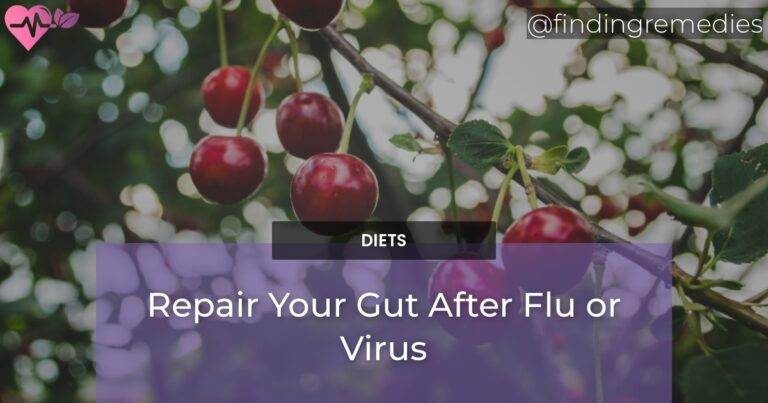When recovering from a flu or virus, it is important to pay attention not only to your respiratory health but also to your gut health. The flu can have a significant impact on the gut microbiome, which plays a crucial role in our overall well-being. Understanding how the flu affects the gut and what measures can be taken to repair it is essential for a speedy recovery and to restore optimal gut health.
Impact of Flu on Gut Microbiome
Disruption of Gut Microbiome during Flu
The flu virus can disrupt the delicate balance of bacteria in the gut, leading to an imbalance known as dysbiosis. Dysbiosis can weaken the immune system and hinder the body’s ability to fight off infections. Additionally, the flu virus can cause inflammation in the gut, further compromising gut health.
Changes in Gut Microbiome Composition
During the flu, there are significant changes in the composition of the gut microbiome. Certain beneficial bacteria may decrease in abundance while harmful bacteria can thrive. This imbalance can have negative effects on digestion, nutrient absorption, and overall gut health.
ALSO READ
Effects on Gut Health and Immune System
The disruption of the gut microbiome during flu can have far-reaching effects on gut health and the immune system. A compromised gut can lead to digestive issues, nutrient deficiencies, and a weakened immune system. Restoring gut health after a flu or virus is vital for overall well-being and a robust immune system.
Best Foods to Eat Post-Flu
Hydrating Foods and Beverages
Staying hydrated is crucial when recovering from a flu or virus. Opt for hydrating foods such as soups, broths, and herbal teas. These help replenish fluids lost during illness and provide essential nutrients to support the healing process.
ALSO READ
Nutrient-Dense Foods to Boost Recovery
Eating nutrient-dense foods is essential to aid in recovery after the flu. Include foods rich in vitamins, minerals, and antioxidants, such as fruits, vegetables, lean proteins, and whole grains. These foods provide the necessary nutrients to support the immune system and promote healing.
Anti-Inflammatory Foods to Reduce Symptoms
Incorporate anti-inflammatory foods into your diet to alleviate flu symptoms and reduce inflammation in the gut. Examples of anti-inflammatory foods include fatty fish, nuts, seeds, olive oil, and turmeric. These foods help calm inflammation and support gut healing.
Foods Rich in Prebiotics to Support Gut Health
Include foods rich in prebiotics, which are indigestible fibers that promote the growth of beneficial bacteria in the gut. Foods such as garlic, onions, bananas, asparagus, and oats are excellent sources of prebiotics. These foods support the restoration of a healthy gut microbiome.
Probiotic Foods to Repopulate Gut
Introduction to Probiotics for Gut Health
Probiotics are beneficial bacteria that can help restore the balance of the gut microbiome. They can be consumed through certain foods or supplements, aiding in the repopulation of beneficial bacteria in the gut.
Fermented Foods as Natural Probiotics
Fermented foods are a natural source of probiotics and can be incorporated into a post-flu diet. Examples of fermented foods include sauerkraut, kimchi, kombucha, and miso. These foods provide a diverse range of beneficial bacteria to support gut health.
Yogurt and Kefir as Probiotic Sources
Yogurt and kefir are rich in probiotics, particularly strains like Lactobacillus and Bifidobacterium. These can help restore the gut microbiome and improve digestion. Look for varieties that contain live and active cultures for maximum benefit.
Probiotic Supplements for Gut Restoration
In some cases, probiotic supplements may be beneficial for restoring gut health after the flu. Consult with a healthcare professional to determine the appropriate probiotic strain and dosage for your specific needs.
Other Strategies to Support Gut Recovery after Flu
Proper Hygiene and Food Safety Practices
After the flu, it is important to maintain proper hygiene and food safety practices to prevent further illness and protect the gut. Wash hands regularly, handle food properly, and ensure that any utensils or surfaces are clean.
Gradual Reintroduction of Foods
When recovering from a flu, reintroduce foods gradually to allow the gut to adjust and minimize any digestive discomfort. Start with easily digestible foods such as soups, broths, and steamed vegetables before moving on to more complex foods.
Managing Digestive Symptoms Post-Flu
If you experience digestive symptoms after the flu, such as diarrhea or bloating, consider incorporating foods that are gentle on the digestive system. Cooked vegetables, plain rice, and easily digestible proteins can help soothe the gut and promote healing.
Seeking Professional Advice if Needed
If you are experiencing prolonged digestive issues or have concerns about your gut health after the flu, it is advisable to seek professional advice. A healthcare professional or registered dietitian can provide personalized guidance and recommendations based on your specific situation.
Can the same methods be used to repair gut health after gastric bypass surgery and after a flu or virus?
Yes, the same methods can be used to repair gut health after gastric bypass surgery and after a flu or virus. It is crucial to focus on a balanced diet, including probiotics, prebiotics, and fermented foods. Additionally, staying hydrated and managing stress levels can aid in repairing gut health after gastric bypass.
Conclusion
Repairing your gut after a flu or virus is essential for a speedy recovery and to restore optimal gut health. By understanding the impact of the flu on the gut microbiome and implementing a gut-healing diet, including probiotic-rich foods and other supportive strategies, you can effectively support your gut recovery and overall well-being. Remember to consult with a healthcare professional for personalized advice based on your individual needs.

